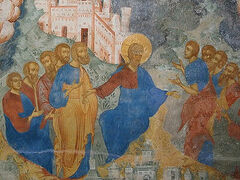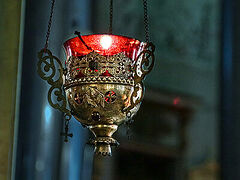In the name of the Father and of the Son and of the Holy Spirit.
Dear brothers and sisters in the Lord, in today’s Gospel reading it was said that the Lord first healed two blind men, and then a raging mute man who was possessed by a demon (Matt. 9:27–35).
The Lord required faith from the person being healed. Where there was unbelief, the Lord could not do many works. Also in this case, He first asked the blind men who asked for healing and mercy, “Do you have faith that I can heal you?” They said: Yes, we do. And the Lord said to them: “According to your faith be it unto you” (v. 29).
We also know that in some cases, even the disciples of the Lord showed a lack of faith. For example, on Lake Gennesaret, when they were in panic and awakened the Lord in this state of mind with the words: “Lord, save us, we are perishing” (cf. Matt. 8:25), not with a calm peaceful disposition, not with a peaceful consciousness that the Lord Almighty can help in their trouble, but in panic. Or when the Apostle Peter denied Him. Or even before that, when he was walking on the sea, Peter doubted and began to drown (see Matt. 14:28–31).
The Lord spoke about faith when His disciples asked Him: “Lord, give us faith.” He said that if you have faith even as a grain of mustard seed, you will say to this mountain, take it and move into the sea, and it will be according to your word (cf. Matt. 17:20).
If we go a little deeper into the meaning of all that we have read in the Gospel, what we heard today in the Liturgy, we will face some misunderstanding and perplexity. Here’s how it turns out. The Lord asked these blind men, “Do you have faith?” What kind of faith are we talking about? It is clear that it is not about the understanding of the mind, but about the faith of the heart. Because if, for example, we have faith at least the size of a mustard seed—but where? In the heart! In another place in the Gospel it says: He will not doubt in his heart (Mk. 11:23). Here, it is not about faith, but about the understanding of the mind that the Lord is the Savior, that He can do anything. Intellectually, we all understand this perfectly. We understand that everything can be obtained by prayer.
For example, we have a need, and we pray to the Lord about this need. And we are right to pray, for we are commanded: Lift up your sorrow to the Lord (Ps. 54, 23). We pray and with our minds we understand perfectly well that the Lord has healed and fulfilled petitions at all times, so our petition will be fulfilled. But for some reason our prayers are not fulfilled immediately. Although, if you pray for a long time, and not about something that is not useful for the soul (because some pray for unconditional deliverance from this or that sorrow, or for good health, or for prosperity) but it’s not always salvific for the person. And the Lord will not always give to the one who asks for such a prayer, because our life is in heaven. And also, because if our outer man, the body, is rotting—that is, sick, suffering, deteriorating—then the inner man is being renewed every day. Therefore, our earthly request is not always fulfilled.
But that’s not really the point right now. If the petitions are not of an earthly but a spiritual nature, if they are of God’s will, then the Lord does as in the parable about the widow who went to the judge who did not fear God nor regard man; but so that this widow would not bother him, he decided, “I will fulfill her petition so that she will not bother me” (cf. Lk. 18:3–5). And so, the Lord says in this parable, “Is it possible that God, Who is not like this unrighteous judge, will not help those who cry out to Him day and night, but is long-tarrying—in other words, slow to fulfill the petition (see v. 6-8).
Why this delay? Because in itself, this long and persistent unfulfilled prayer is a matter of faith. Think about it more deeply yourself. This is a matter of faith. For example, we ask to get rid of some passion, some temptation harmful to the soul. There are such cases, when the passion of drunkenness or something else wars against us. And a believer prays from the heart, “Lord, deliver me from this vice, from this trouble, from this misfortune.” But his petition is not fulfilled quickly. That is, he goes to confess it many times, prays for many, many years. Then the Lord delivers him. He will surely deliver him.
But why do we have to suffer and pray for so long? Because this unfulfilled prayer is an opportunity to strengthen the will and establish faith. That is, the Lord does not fulfill our request, but we believe that there is a God, and we will continue to ask until we receive our request. The mind understands this. Our heart is of little faith, therefore, a person must pray for a long time so that by this prayer, that is, by an act of faith (prayer, among other things, is an act of faith), he can demonstrate his will for faith to occur in him, for faith to increase.
It is not enough to ask, Lord, increase faith in us (cf. Luke 17:5). We need to live by faith; and this long, persistent prayer is one of the works of faith. The Apostle James says, Faith without works is dead, that is, faith is manifested by works (Jas. 2:20–26). Prayer is just one of the works of faith, when we ask and persistently believe that the Lord will sooner or later fulfill our petition. It’s just that all this is created by labor. This is one side of the matter.
These blind men had heartfelt faith that the Lord would heal them. The Lord of the Heart, knowing this perfectly well, asked them anyway, “Do you believe that I can do this?” Again, why was the question asked? Because the heart believes in the truth, but the mouth confesses unto salvation (Rom. 10, 10). That is, both are necessary. Confession of the mouth is also a work of faith—a small but necessary work.
That’s one thing. Secondly, it was necessary to believe not just that the Lord is a Miracle Worker. No. But to believe not as when the Lord asked His disciples, Who do people say that I am? And they answered what they heard from men. Some say that He is Elijah the Prophet or some other of the prophets, and so on. But the Apostle Peter said, You are the Christ, the Son of the Living God (Matt. 16:16). And the Lord praised him, saying, blessed are you, Simon bar Jonah, because this was not revealed to you by flesh and blood; that is, not by your human earthly wisdom, but by my Father which is in heaven, by the grace of the Holy Spirit— for Christ is known by the grace of the Holy Spirit (v. 17).
And these blind men also had the faith necessary for a miracle in their hearts, naturally not because they were so good or because they took such faith and had this faith. No, but because God gave them this faith by the grace of the Holy Spirit. He gave this faith in their heart. It does not mean that they had such faith that they could move mountains and walk on water. Nothing like that. They were simply given this faith at that moment to perform the miracle. We cannot say that some quality can be in us all the time, because the apostles were occasionally cowardly up to a certain time, until they were endowed with power from above. And there are moments of both firmness and lack of faith in us.
Here we know this perfectly well, for example, when walking through some frightening place in the evening through the forest. Intellectually, we understand that there is Divine Providence that will not allow anything unnecessary to happen. There is our guardian Angel who protects us better than a thousand magnificent bodyguards. We understand everything intellectually. Sometimes this understanding is confirmed in the heart by faith, and we are not afraid. We walk joyfully through this dark place and feel as if we are under God’s protection. But sometimes, for some reason, we feel a kind of cowardice. Why? Because any act of grace is not our own property. The Spirit blows wherever it pleases but you do not know where it comes from or where it is going, says the Holy Scripture (Jn. 3:8). Therefore, first of all, we should not be proud. If we have any courage, firmness of faith, any other quality of character, virtuous quality, we must understand that it is not ours. It is a living action in us of the divine power of God, a living action. God is working.
The grace of faith, the grace of any virtue, is not some kind of human property. Seraphim of Sarov said that the goal of our Christian life is to acquire the grace of the Most Holy Spirit of God. The conversation is simple, beautiful, clear, but we do not understand it. That is, people have a wrong understanding. They think, I will put something into myself as a bag of grace and therefore I will be saved. Well, it’s good at least to have that kind of understanding. Sometimes people understand their salvation even more wrongly. For example, as if it means to get to heaven geographically, not because they are in God internally, but just somehow “to get at least to the edge of paradise.” But this is a completely superficial misunderstanding.
That’s not the point. What is the point? That God’s grace, which we need to acquire here, is not some kind of property that we can hold onto in some way of our own. It is nothing of the sort. This is a living divine force, which, like God, continuously maintains the entire universe, everything that we see in the surrounding physical world, because it is not maintained by itself. God is Almighty. The very word Almighty gives an understanding that He maintains everything. For example, an animal is walking, running. Here’s a cat running around alive, how is it alive? Not because it is autonomously alive, but because every soul lives by the Holy Spirit. Its life depends on the active life-giving power of God. If this effective life-giving force is not performed for even one second in a cat, it will die, as would all of us. Likewise, the physical world depends on the living action of the Almighty. You can’t appropriate anything. You cannot say that this is something of your own.
We are totally dependent on God at every moment of time. And all our virtues are the living action of grace in us. If God wants it, God will give it. For example, we have qualities of character, which are sometimes good. Someone is meek, peaceful, benevolent. But if God does not give us these qualities for five minutes, we will become angry, irritable. And there’s no getting away from it. I think that each of us has experienced this state when God takes away His grace for a short time to show us what we are if God does not work within us. So also, faith, it is given as a living divine action. And these blind men do not think that they were some kind of holy saints. No, they were people to whom God gave a living effect of faith in the heart, that is, grace. Then, naturally, this action at this level probably was not preserved. Having survived, they had to work hard to gain true faith in God with their whole lives.
All our life, all our efforts should be directed towards this. What if, for example, a person received something, some action of grace, and then stopped strengthening it? The kingdom of God is compelled (The kingdom of heaven suffereth violence, and the violent take it by force.” Mt. 11, 12). This does not mean that they exercised force, they received grace and so now can relax. No. The kingdom of God is taken by force the entire time of our earthly stay. It is compelled not in some separate area of life, but in our whole life. At every moment of our life, we must compel ourselves in everything, both to prayer and to any virtue. And most importantly, to humility; that is, to the realization that truly we have nothing of our own, except for the divine grace and power that is working in us. This consciousness first of all makes it possible for God to work in us, including in our faith.
Therefore, if we say that the spiritual fruit is love, joy, peace, long-suffering, goodness, mercy, faith, meekness and self-control (cf. Gal. 5:22–23), then all these actions are varieties of the fulfillment of the divine power of the Holy Spirit in us, and they are based on humility, on the consciousness that it is not ours, but is by the grace of God. And we should try with all our strength not to forget it. Our salvation depends on it. The Lord is certainly the first Teacher of humility for all of us. And we will not be able to forget that we are nothing. Not absolutely nothing, for we are God’s creatures, we are the crown of creation. But God will never let us forget that we can’t do anything without Him. St. John of the Ladder said that where there was a fall, pride preceded it. And if we forget a little bit that what is good is not ours, but given from God, we immediately suffer a fall, great or small—either we get annoyed, or we overeat, or God forbid, we fall into some worse sin. And all this is nothing but a kind, saving reminder to us that we are nothing without God, and that the effort to maintain the consciousness of this memory must be in us constantly.
This is the most important reason why we are saved. As our holy Optina Elders used to say, “If there is humility, there is everything; if there is no humility, there is nothing.” And you and I, remembering these words and calling out to our venerable elders in our prayers, will in every way with great wisdom (he who is wise humbles himself) seek God through the humble state and consciousness of the soul; and we will certainly find Him, because God said that He resists the proud, but gives grace to the humble (Jas. 4:6; 1 Pet. 5:5).





